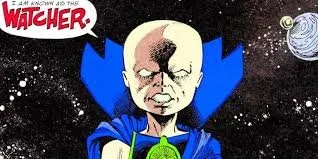Watching the Detectives
Chapter One:
Watchers and Watchmen
"I am the Watcher! For countless eons I have observed your world and recorded its significant events."--
What If?
volume 1, 26
"The morality of my actions escapes me." --
Dr. Manhattan,
Watchmen
Chapter 4
Watching the Detectives
"Watching" is an unlikely metaphor for the avid consumer of superhero comics, since it suggests action that unfolds before the eyes of passive viewers; once the action starts, it will continue regardless of the audience. This is not a case of the proverbial tree falling. If the viewers walk away or close their eyes and ears, the show will definitely go on.
Not so for comics. Reading comics, like reading prose, requires that the reader pay attention. Though it neither burns calories nor advances step counts, reading is active. All the more so for comics. As Scott McCloud's influential Understanding Comics (1993) argues, comics can only function as a narrative experience though an operation that takes place in the mind of the reader: closure. The gaps between comics panel are not just literal (the "gutters" or blank spaces found in most North American comics); they are a foundational part of the reading experience. The reader unconsciously fills in the gaps between the actions represented in sequential panels, inferring a relationship among them that is not usually explicit. We take this process for granted, but it is easy to imagine a particular form of neurdivergence that could make this process impossible. If a ball is thrown towards home plate in one panel and a batter hits it in another, we take for granted that a reader will connect the two actions, but that is only because we automatically make such connections ourselves.
Watchers would probably make more sense for film and television, and Marvel's Uatu has successfully made the transition from comics to video on more than one occasion, most famously as the narrator of the 2021 television series What If. Yet watchers and watching in superhero comics persist. Uatu and DC's Monitor(s) were more recently joined by Tempus Fuginaut, a member of a race of godlike beings who protect the DC multiverse from incursions by the Dark Multiverse. Before joining the Legion of Superheroes, Mon-el (Lar Gand) spent a thousand years trapped in the Phantom Zone, observing the DC universe but (mostly) unable to interact with it. The robotic Recorders of Marvel's Rigellian Empire do exactly what their name implies, though in a particularly annoying fashion (preceding every utterance with headwords such as"Statement:" or "Query:"). In the alternate Marvel Universe of the Earth X stories, Uatu has forced the robot designated "X-51" (and also "Machine Man" and "Aaron Stack") both to watch for him now that Uatu is blind, and to take over Uatu's frequent narrative function by telling him (and the reader) what he sees. All of these characters are joined by other godlike figures who are more likely to supplement their watching with action (at Marvel: Eon, Epoch, Eternity, and at DC: the Phantom Stranger, the Guardians of the Universe, Pandora, the Quintessence). There are also the occasional reader figures, such as Destiny of the Endless, who, originally introduced as the host of one of DC's horror books, spends his entire existence reading from the book that tells all the events of the past, present and future. But the visual medium of comics seems to encourage representations of watching over reading.
Nope, nöthing creepy about this at all
Watching, then, is what happens to reading when it is transposed into the medium of (superhero) comics. It is a way to represent the role of the reader while only partially maintaining a readerly distance. Going back to Morrison's "fiction suit" metaphor, the movement from reader to watcher involves donning a suit that is not quite a superhero costume. This is not a matter of pure fantasy wish fulfillment, since the reader does not become the hero; rather, the reader is put into a different vantage point from which the view the action, while also weakening the boundaries between observer and hero.
These reduced boundaries are no small matter. Because the watcher figures are located inside the fictional world, they have an option that the actual reader does not: they can decide to intervene. This, in fact, is at the heart of nearly all the classic stories about Uatu: in the early days, Uatu deserves the title "Watcher" only in the breach. But what is it that Uatu is actually watching? Technically, everything, but we only see Uatu playing observer during events deemed significant. Indeed, Uatu's very appearance on the scene has become a kind of shorthand alerting not just the reader, but even the characters who are familiar with his function, to the import of the story in progress.
Watchers want to watch what superhero readers want to read: stories in which something bad happens (a crime, a disaster, a cosmic crisis) and superheroes choose to act. If superhero readers are indulging in a fantasy of extraordinary powers and concomitant extraordinary adventures, watchers are satisfying a kink of their own: sworn only to watch, they cannot get enough of watching people do.
Next: Those Who Can
